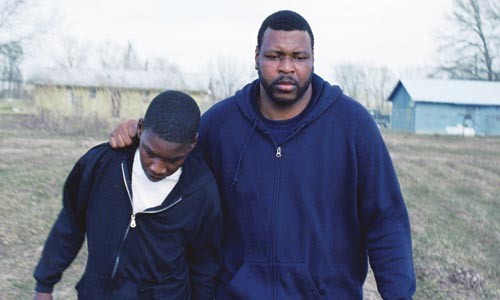The awards season is upon us, and while "smaller" films like The Wrestler, Slumdog Millionaire and Milk get much ink for stretching the boundaries of the megaplex, they're a long way from the independent film scene that helped nurture their creators.
But way outside Hollywood's golden circle -- in which "indie" is just another quickie branding term -- films, independent in spirit, style and financing, still exist.
One such work is Ballast, a markedly austere debut feature from writer-director Lance Hammer that defies even what we expect from an "indie" these days. (While this decidedly non-mainstream feature is unlikely to ever go wide, it did pick up two awards at Sundance for best director and best cinematography.)
Hammer's lean three-person drama takes place over a few wintry days in the Mississippi Delta. It's a slowly unfolding chapter of a story-in-progress that opens with an unexpected death.
A man named Darius has committed suicide, and his twin brother, Lawrence (Michael J. Smith), sits nearly catatonic in the man's small, sparsely furnished house. The two lived in modest side-by-side homes set in an expanse of farmland, and they ran a nearby grocery store.
But Darius left a letter to his ex-wife, Marlee (Tarra Riggs), and Lawrence's delivery of the note revives a dormant, but antagonist relationship. Marlee, who works as a cleaning lady, has her own struggles, including managing her angry and confused 12-year-old son, named James (JimMyron Ross), who's already in trouble with drugs and crime.
Things happen in Ballast, but no more so than they do in life. These are ordinary people with ordinary problems, yet Hammer allows us feel the slow crush of their burdens: jobs, messy families, schools, loneliness, money, unresolved anger and grief, and even the dismal, damp season. And he does so with the leanest of cinematic tools: Ballast has no score, no professional actors and no visual gimmicks.
Hammer is confident enough to let visuals convey much of Ballast's mood and backstory. The camera, manned by Lol Crawley, is unsparing, building a series of small scenes -- some are virtual snapshots -- that slowly reveal the characters, their histories, their environment, their failings and their aspirations. Other scenes just set the downbeat tone, such as Lawrence's dinner at a neighbor's house or James' desultory rambles over the bleak fields.
The dialogue is minimal -- there are perhaps only a couple hundred lines (further discounted by those that are mumbled and incoherent) -- and often delivered in halting or one-sided exchanges. A short, angry back-and-forth deep into the film feels almost as thrilling as a car chase.
A less-than-patient viewer will be frustrated, and it's true that not much happens, at least in terms of plot. But those who don't need the easy entertainment of snappy patter, flashy editing or underscoring pop songs, and who can simply absorb Ballast, may find themselves startled at its eventual impact. No, nothing shattering happens, but Ballast -- and its wordless final scene -- will linger.
"Ballast" is a nautical term for weight added to the hold of a ship to provide stability, particularly in rough seas. Its meaning here marks its transformative effect. We perceive that the weight of history has been crushing these individuals, virtually pinning them in place. Yet when that weight is re-considered -- when, perhaps, it is placed in their collective hold correctly -- the cooperation wrung from their shared troubled histories gains them a small measure of stability. It may not mean entirely smooth sailing, but it at least suggests forward progress.

Starts Fri., Jan. 30. Harris















